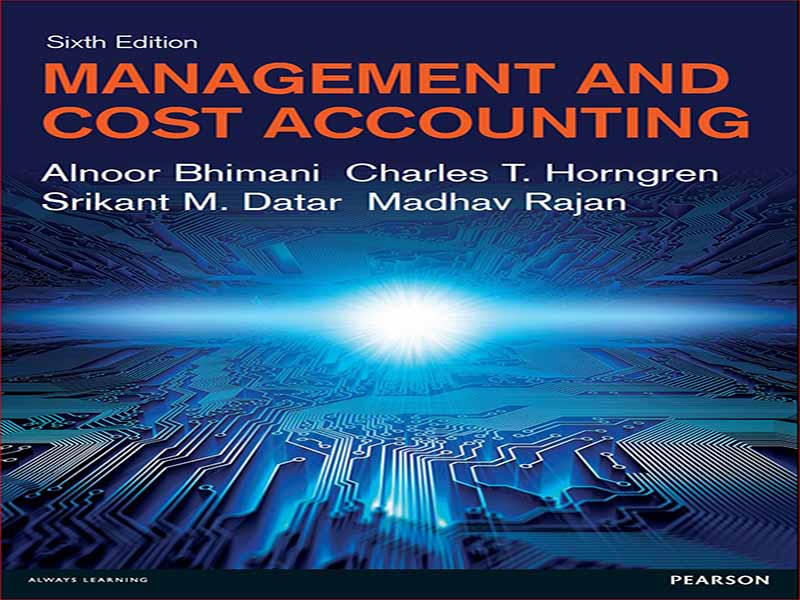- عنوان کتاب: Management and Cost Accounting
- نویسنده: Alnoor Bhimani
- حوزه: حسابداری
- سال انتشار: 2015
- تعداد صفحه: 409
- زبان اصلی: انگلیسی
- نوع فایل: pdf
- حجم فایل: 22.3 مگابایت
حسابداری زندگی ما را شکل می دهد. سازمان ها را تغییر می دهد و محیط اجتماعی، اقتصادی و فیزیکی ما را تغییر می دهد. چه درگیر تولید و/یا خواندن اطلاعات حسابداری باشیم یا نه، بر آنچه میتوانیم و نمیتوانیم انجام دهیم و در نتیجه بر رفاه ما تأثیر میگذارد. تصمیمات شرکت در مورد توسعه محصول جدید، استراتژی قیمت گذاری، استخدام کارکنان و سطوح حقوق عموماً تحت تأثیر اطلاعات حسابداری است. شیوه ای که یک مدیر عمل می کند اغلب با نحوه واکنش او به داده های حسابداری مرتبط است. در مواقعی، حسابداری انواع خاصی از رفتارها را برمی انگیزد و دیگران را دلسرد می کند. در بیشتر سازمان ها، تصمیمات، اقدامات و رفتار انسانی پیوند مستقیمی با ماهیت، استفاده و تمرکز اطلاعات حسابداری پیدا می کند. این متن در مورد درک تهیه و استفاده از اطلاعات مدیریت و حسابداری بهای تمام شده در این زمینه است. در حالی که حسابداری مدیریت به اندازه گیری و گزارش انواع اطلاعات مالی و سایر اطلاعات به مدیران در تعقیب اهداف سازمانی و سایر اهداف مربوط می شود، حسابداری بهای تمام شده بیشتر به اطلاعات مربوط به کسب و مصرف منابع مربوط می شود. حسابداری بهای تمام شده تمایل دارد ورودی مفیدی را در حسابداری مدیریت ارائه دهد. دغدغه ما این است که هم مدیریت و هم حسابداری بهای تمام شده را در بر گیرد و به ویژه بر طراحی، استفاده و نقش اطلاعات حسابداری در مدیریت فعالیت های سازمانی تاکید کنیم. هدف ایجاد تعادل بین جزئیات فنی و بینش سازمانی است تا در مورد موضوعات مورد علاقه اولیه برای انجام فعالیت های مدیریت بحث شود. بنابراین تمرکز بر مفاهیم فنی و سازمانی، تجزیه و تحلیل و عملکرد در مقابل تصمیم گیری مدیریت است. مدیریت و حسابداری هزینه یک رشته پویا است که با بسیاری از جنبههای محیط سازمانی که در آن در سراسر کشورها، تنظیمات صنعتی و عملکردهای مدیریتی وجود دارد در تعامل است. این مستلزم استفاده از تکنیک های قدیمی و مفاهیم جدید است. در نتیجه، این کتاب حوزههای موضوعی معمولی مانند هزینهیابی شغل و هزینهیابی فرآیند، روابط هزینه-حجم-سود، تصمیمات سرمایهگذاری سرمایه و سیستمهای کنترل بودجه را در پرتو تغییرات در شرایط عملیاتی امروزی پوشش میدهد. علاوه بر این، ما به رویکردهای نوآورانه در حسابداری مدیریت پرداختهایم که به عنوان مثال به نگرانیهای کیفیت، مفاهیم عملکرد، مسائل عملکرد غیر مالی و تحلیل استراتژیک مربوط میشود. در سرتاسر فصلهای کتاب به موضوعات نوظهور در حوزه حسابداری مدیریت اشاره میکنیم که برای سازمانهایی که به دنبال تکامل سیستمهای حسابداری مدیریت خود هستند، مهم تلقی میشوند. علاوه بر این، ما در مورد پیامدهای احتمالی رویه های حسابداری مدیریت مربوط به مدیریت و نگرانی های سازمانی بحث می کنیم که اخیراً اما به سرعت در حال تکامل هستند. بنابراین، ما به ارتباط بسیاری از مسائل، از جمله پایداری، دیجیتالی شدن، مدیریت دانش و سرمایه فکری، حاکمیت سازمانی، کلان داده ها و مدیریت هزینه بین سازمانی اشاره می کنیم که برای تغییرات بالقوه حسابداری مدیریت اهمیت دارد.
Accounting shapes our lives. It changes organisations and alters our social, economic and physical environment. Whether or not we engage in producing and/or reading accounting information, it influences what we can and cannot do and, therefore, affects our well-being. Corporate decisions regarding new product developments, pricing strategy, staff recruitment and salary levels are generally influenced by accounting information. The way in which a manager acts is often associated with how he or she reacts to accounting data. At times, accounting motivates certain types of behaviour and discourages others. In most organisations, decisions, actions and human behaviour find direct links with the nature, use and focus of accounting information. This text is about understanding the preparation and use of management and cost accounting information in this light. Whereas management accounting is concerned with the measurement and reporting of financial and other types of information to managers in their pursuit of organisational and other goals, cost accounting is more concerned with information on the acquisition and consumption of resources. Cost accounting tends to provide a useful input into management accounting. Our concern is to encompass both management and cost accounting, stressing particularly the design, use and role of accounting information in the management of organisational activities. The intent is to balance technical detail and organisational insight so as to discuss issues of primary interest to the discharge of management activities. The focus is thus on technical and organisational concepts, analyses and practice vis-à-vis management decision making. Management and cost accounting is a dynamic discipline which interacts with many facets of the organisational environment in which it exists across nations, industrial settings and management functions. It entails the application both of long-established techniques and of newly emerging concepts. Consequently, the book covers conventional topic areas such as job costing and process costing, cost–volume–profit relationships, capital investment decisions and budgetary control systems in the light of changes in modern-day operational circumstances. In addition, we have addressed innovative approaches in management accounting which relate to, for example, quality concerns, throughput concepts, non-financial performance issues and strategic analysis. Throughout the book’s chapters we point to emerging themes within the field of management accounting which are regarded as important for organisations seeking to evolve their management accounting systems. Additionally, we discuss the possible implications for management accounting practices of management and organisational concerns which are recent but fast evolving. We point, therefore, to the relevance of many issues, including sustainability, digitisation, knowledge management and intellectual capital, enterprise governance, Big Data and inter-organisational cost management, which hold significance for potential management accounting practice changes.
این کتاب را میتوانید از لینک زیر بصورت رایگان دانلود کنید:
Download: Management and Cost Accounting





































نظرات کاربران